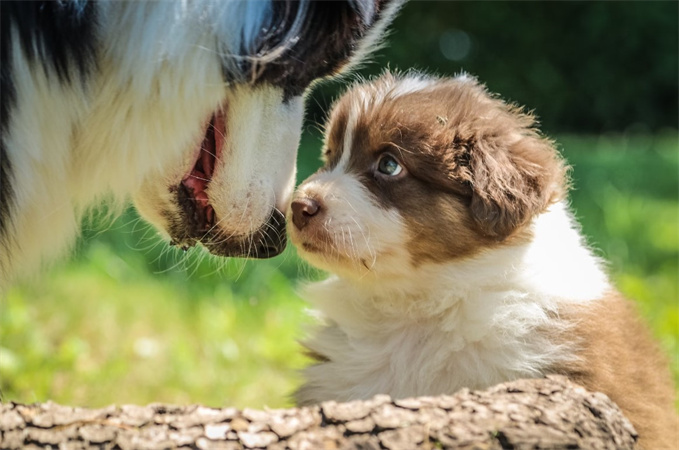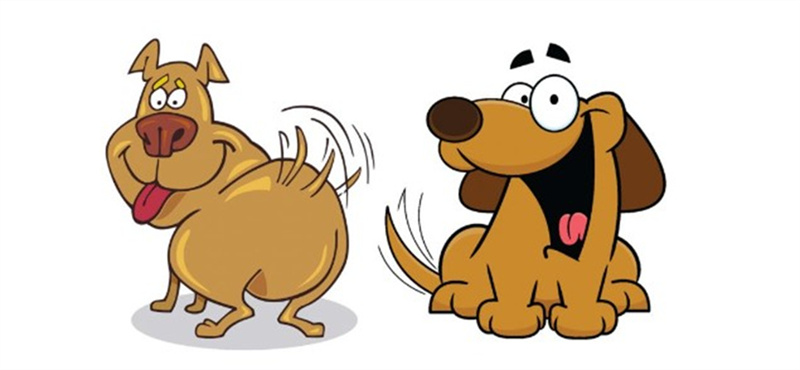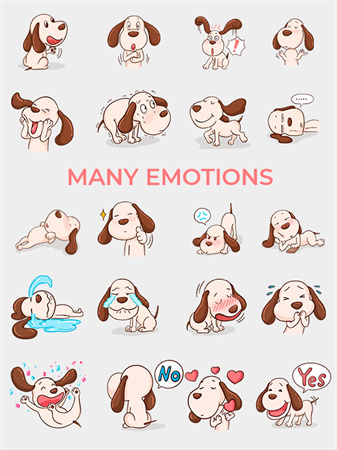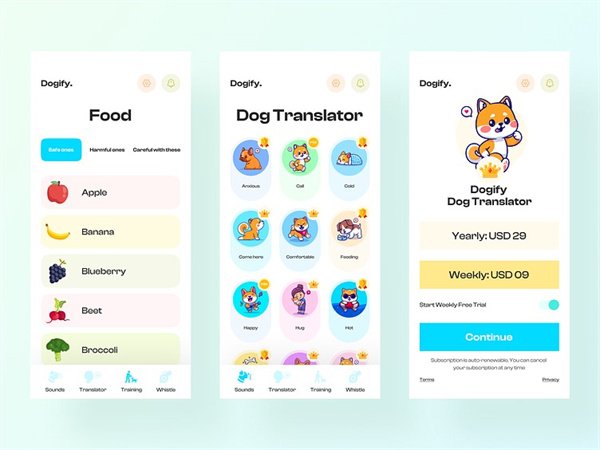My Talking Pet: How to Teach a Dog to Speak
Have you ever wanted to know exactly what your pet dog is thinking about? Or maybe you want them to know how much you love them and hear what they want to say to you? Well, it might have felt impossible to know what your dog is thinking about but with the latest technology, you can now make your dog speak using buttons. Imagine deciphering your dog's desires, emotions, and thoughts using a series of buttons that allow them to express what they’re thinking of and what they need.

Figuring Out Doggy Body Language
Understanding your dog's body language is important for effective communication and building a strong bond, trust and love. Let's look at subtle details of some dog habits to figure out what your pet friend is trying to say.
Tail-Wagging:
Happiness Indicator: In most instances, a wagging tail is a clear expression of joy and happiness. It signifies that your dog is content and pleased.
Invitation to Play: If your dog stands on two feet and playfully grabs you with their front paws while wagging their tail, it's an invitation to engage in play. This behavior indicates their excitement and desire for interaction.

One Front Leg Arches:
Attention to an Object: When a dog leans forward and one of its front legs arches, it indicates a heightened focus on an object in front of them. This behavior suggests curiosity and interest in exploring or interacting with the identified item.
Sniff the Ground:
Exploration and Information Gathering: A dog's nose is a powerful tool for exploration. When your dog sniffs the ground, it's not just a casual behavior; it's a way for them to gather information about their surroundings. They are trying to understand the environment, identify scents, and learn about other animals that may have passed through.
Show Teeth and Whine:
Expressing Displeasure: While dogs typically won't show their teeth and whine towards their human companions, if they do, it's a sign of displeasure or protest. This behavior doesn't necessarily indicate an intention to bite; rather, it's a demonstration of frustration or disagreement, much like the dramatic gestures of cowboys in Western movies.
Show Belly:
Submission and Trust: The belly is a vulnerable part of a dog's body. When a dog exposes its belly, it's a clear sign of submission. This behavior communicates that the dog recognizes a stronger presence and is not posing a threat. It's an act of trust and sincerity, acknowledging the authority of others.
With Tail Between Legs:
Fear or Unease: The classic "running away with tail between legs" behavior is a manifestation of fear or unease. When a dog senses a situation is not right or feels threatened, this action is a tactic to create distance. It doesn't imply a lack of bravery but rather serves as a self-preserving strategy to assess and navigate potentially challenging situations.

Head Tilt:
Curiosity and Interest: One of the most adorable and puzzling behaviors exhibited by dogs is the head tilt. When a dog tilts its head to the side, it often indicates curiosity and interest in what they are hearing or seeing. This charming gesture is commonly observed when a dog is trying to comprehend a new sound, such as a high-pitched noise or an unfamiliar voice.
Expression of Emotion: The head tilt is also associated with emotional expression. Dogs may tilt their heads in response to the tone of your voice or your facial expressions. This behavior suggests an attempt to connect with you on a deeper emotional level, showing that they are attuned to your cues and are eager to understand your feelings.
Communication Signal: In certain situations, a dog's head tilt can serve as a communication signal. For example, if you ask your dog a question or use a specific word they recognize, the head tilt may be their way of acknowledging the communication and expressing engagement. This behavior highlights the interactive nature of dogs and their desire to participate in the communication process.

Understanding these subtle cues in your dog's body language can significantly enhance your relationship, fostering trust and effective communication between you and your canine companion. By paying attention to these signals, you'll be better equipped to respond appropriately to your dog's needs and emotions before you use a doggy translator.
How to Teach a Dog to Speak: On Command Dog Training
When it comes to on-command dog training, buttons become the tool that help us understand our furry friends. Each button holds a special word or phrase, letting dogs express their needs. It's like they're talking to us! Through patient training, dogs learn to connect by pressing specific buttons with different meanings, which creates a personalized language just for them.
Talking Buttons for Dogs

If you are wondering how to teach a dog to speak? Follow these steps:
- Pick the Right Buttons
Start with talking buttons for dogs that have clear labels, like "play," "food," or "outside." Simple words that match your dog's daily routine. - Introduction Time
Get your dog used to the buttons by connecting them with actions. Press the "food" button before meals, linking the word to the yummy activity. - Repeat, Repeat, Repeat
Practice regularly. Encourage your dog to press buttons during the right moments. Doing it often helps them connect words with actions. - Rewards Matter
When your dog gets it right, celebrate! Treats, praise, or playtime work great as rewards during bark dogs training, ultimately making the learning process fun. - Learn More Words
Introduce new buttons slowly to expand your dog's vocabulary. With time and practice, they can express some of their thoughts and desires. - Understand the Context
Dogs are smart! Encourage them to press buttons in response to questions, showing they understand the meaning in different situations. - Let Them Take the Lead:
Allow your dog to use buttons on their own. This independence strengthens your bond and shows off their newfound ability to talk.

Talking Pet: Dog Talking App
Dog Translator (Android)
You must have wanted to understand your dog's barks at one point or another. The "Dog Translator" app for Android makes it possible! Chat about toys, treats, or even decode the secrets of your pet's tail. It's a fun way to bond with your furry friend and turn your home into a place of pet talk and obedience.
Dogify: Dog Translator Trainer (iOS)
If you're an iPhone user, check out "Dogify: Dog Translator Trainer." This cool app by Online Tracker LLC translates your words into dog language. Have a playful conversation with your dog, understanding what they're "saying" in real-time. It's not just an app; it's a fun way to connect with your furry buddy.
Bonus Tip: HitPaw VoicePea the Best AI Voice Changer
Introducing HitPaw VoicePea, the ultimate AI voice transformation tool that goes beyond entertainment. Not only can you unleash your creativity in recordings and live chats, but this versatile tool also lets you connect with your furry friend on a whole new level. Yes, you heard it right – communicate with your pet dog like never before!
HitPaw VoicePea Features- Diverse Voice Effects: Spice up your recordings and live chats with a variety of voice effects and filters.
- Real-time Voice Modulation: Instantly tweak your voice during online gaming, voice chats, and yes, even when chatting with your furry friend.
- Text-to-Music Generator: Say goodbye to complicated music creation – create AI-generated music with ease.
- Celebrity Voice Transformation: Turn your audio into celebrity-like voices for a fun and realistic touch.
- AI Cover for Music: Transform your favorite songs into the voices of renowned artists using advanced algorithms.
Ever wondered what your dog would sound like speaking human language? With HitPaw VoicePea, you can take out dog voices and have a playful conversation with your canine companion. It's a delightful way to add a touch of whimsy to your interactions and strengthen the bond with your four-legged friend.

Conclusion
As we wrap up our journey of how to teach a dog to speak, remember that dogs have a lot to share. From playful apps to talking buttons for dogs, we've explored the ways our furry friends communicate.
Looking for a way to add some laughter to your pet talks? Enter HitPaw VoicePea. This handy tool not only boosts your creative side but also lets you have fun, imagining what your dog would sound like in different voices.
So, whether you're giggling at your pet's "voice" or just looking to enhance your overall communication, give HitPaw VoicePea a try.







 HitPaw Edimakor
HitPaw Edimakor HitPaw VikPea (Video Enhancer)
HitPaw VikPea (Video Enhancer)



Share this article:
Select the product rating:
Daniel Walker
Editor-in-Chief
My passion lies in bridging the gap between cutting-edge technology and everyday creativity. With years of hands-on experience, I create content that not only informs but inspires our audience to embrace digital tools confidently.
View all ArticlesLeave a Comment
Create your review for HitPaw articles